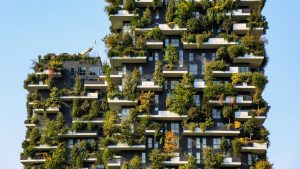Description assignment

The Universities of Applied Sciences Aeres in Almere, Amsterdam, Avans and van Hall Larenstein do research together in the coming 2 years on biobased and nature inclusive building and spatial development. It’s up to you to choose at which University of Applied Science you would like to work: Amsterdam or Avans. And cooperate with the other 2 universities as well.
Part of the research aims for the possibilities to provide space in and behind the facade, that will increase the nature inclusiveness. It is that outer shell of the buildings and the nearby outer space where biobased materials can be applied. The façade, the rims and the roof are transition areas between building and outer space and therefore are part of the experience value and residential quality of the user of the space, but also for the biodiversity linked to the ecosystem.
The case study for this assignment is “Spoorzone Waarder”, provided by Prorail. ProRail is responsible for omaintaining and managing the main railways in the Netherlands, amongst which a large amount of under stations. A big part of these understations is technically outdated and need to be replaced in the coming years. ProRail has planned to make a standardized design for the stations, which consists of biobased and modular base-unit, on which, depending on the location, different types of wall panels can be attached. The company want these units to become part of the ecological system and add to biodiversity. The company requested the universities to do research on how this can be developed.
There are several intersting questions which researchers would like to solve, together with you!. The assignment is suitabe for studentes from Built Environment (Architectuur, Architectonische Techniek en Project Management), Mechatronics or electrotechnicks (automatisation of monitoring), Spatial development, Environmental sciences (sustainability) and Ecology/Biology.
Route
We commence the graduation or internship with a mutual introduction, perhaps before the summer break. You will meet people (researher, lecturers and other students) involved in the project. The first weeks you will work on the interdisciplinairy, mutual research assignment and determining the methods of research. For that, we start off with compact literature research, references and best practices are analysed, interviews held en (lokal) biobased materials registrered (material overview). With these first analyses further specifications and boundaries for research are determined.
In the next phase, you as student determine, preferrably in multidisciplinary duo’s or trio’s, a reseearch assignment suitable for the mutual framework and doable within the timeframe of your graduation period.
For example research in one of the following topics:
- Research on behaviour and degradation (radiation, temperature, moisture) of promising identified biobased materials in a façade or roof application and the nearby outer space;
- Research on digital production methods for promising identified biobased materials in a f façade or roof application and the nearby outer space;
- Research on the experience value of a nature inclusive biobased outer shell;
- Design and develop the biobased en modular base unit for the understations of Prorail;
- Design and develop a prototype facade elements varying in i.e. material, location, oriëntation, design and surface structure;
- Perform a feasibility analysis for the relationship of a biobased facade (business modells, flow chart, impact analyses, etc.);
- Develop a guideline and advice for the biobased façade design of the case study Spoorzone Waarder;
- Drawing up and work out a flow scheme for determining the best possible classification of nature inclusive facade cladding per possible location in the Netherlands, depending on the biotopes and (target) species present.
The basic principle of the set up of the graduations is that by linking all projects, starting together and sharing information, all projects will benefit.
During the graduation process, a number of brainstorming sessions and knowledge exchanges take place via documents Teams. In addition, four physical afternoons will be organized (one at each university of applied sciences) at which various researchers will also be present.
Mogelijke onderzoeksvragen
- Which materials will enhance nature-inclusive spatial development and how can we stimulate application of these materials?
- Which types of vegetation (species and applications) enhance nature-inclusive spatial development and how can this be integrated in the built environment?
- What are the effects of nature-inclusive building and spatial development on humans (users, environment)?
- What are the effects of nature-inclusive building and spatial development on the ecosystem?
Do you enjoy:
- Graduating on a multidisciplinary case study with students of different back grounds?
- Working on your own project within a larger research, in which you have easy access to researchers and experts?
- Working with and for a real client , on a case study which will be realised (Spoorzone Waarder buildings)?
Then the graduation project (or internship) on Nature-inclusive, biobased facades might be something for you!
